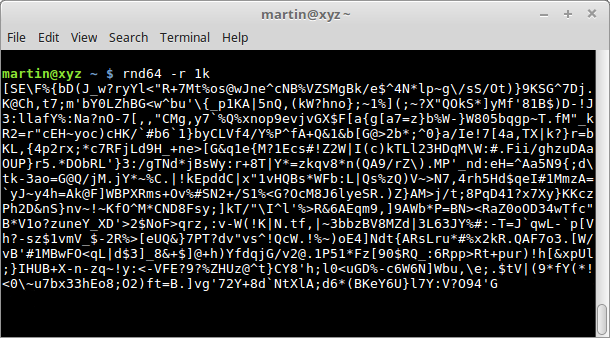Purpose
Usage
Downloads
Speed
Build
Generate large files (over 4 GB, non-sparse) or large streams of binary / character data (200 GB+) at fast generation rates
(~8.5 GB/sec i3 desktop, ~4.6 GB/sec AWS microinstance using null byte stream output on Linux).
And the purpose of junk data?
Uses:
- test files for development, network transfer etc,
- system stress testing,
- network speed tests.
A few Windows programs exist to create large files, and there are plenty of shell scripts using dd
Yet, I just needed something cross-platform with simple command-line options.
- Linux x64
- Windows x64
- Mac arm64
rnd64 [option] <size> <file>
rnd64 [option] <size> | <program>-a (all) binary bytes includes control codes
-f (fastest) null character (0) fastest generator
-r (restrict) characters 33 to 126 7-bit printable ASCII, safe for terminal output
-c (crypto) crypto-sourced bytes Linux: /dev/urandom, Windows: CryptGenRandom (slow)
size 1K, 100M, 8G
rnd64.exe or rnd64 (Windows) display command-line options, as above
./rnd64 (Linux)
rnd64 -a 1k f.txt output 1 kB of random binary bytes to the file 'f.txt'
rnd64 -f 1k f.txt output 1 kB of null bytes to 'f.txt'
rnd64 -r 1k f.txt output the restricted range of 7-bit ASCII characters (33 to 126) to 'f.txt'
rnd64 -f 4g | pv > /dev/null send 4 GB of null bytes to /dev/null with 'pv' displaying the throughput rate (Linux)
rnd64 -c 1k | ent pipe 1 kB of crypto bytes to the program 'ent'
rnd64 -a 1k | nc 192.168.1.20 80 pipe 1 kB of random bytes to 'netcat' to send to 192.168.1.20 on port 80
rnd64 -f 100g | pv > /dev/null stress a system
nc -lk -p 3000 > /dev/null local network speed test (machine receiving, 192.168.1.20)
rnd64 -f 1g | pv | nc 192.168.1.20 3000 (machine sending)
When using RND64 to generate large files (over 1 GB):
- HDDs: consider the mechanical drive's age and performance,
- SSDs: consider the potential write wear.
As well as warming the CPU, RND64 is quite capable of exhausting all drive space, finishing off failing HDDs, and reducing SSD lifetimes.
Download from Releases
or directly:
RND64 is fast:
i3-4170 CPU 3.70GHz, 4.4 kernel:
martin@xyz ~ $ rnd64 -f 4g | pv > /dev/null
4GiB 0:00:00 [8.51GiB/s] [ <=> ]
dd on same machine:
martin@xyz ~ $ dd if=/dev/zero of=/dev/null bs=4G count=1 iflag=fullblock
4294967296 bytes (4.3 GB, 4.0 GiB) copied, 0.959431 s, 4.5 GB/s
AWS Xeon E5-2670 2.50GHz, single core:
[ec2-user@ip-172-31-7-109 ~]$ rnd64 -f 4g | pv > /dev/null
4GiB 0:00:00 [4.61GiB/s] [ <=> ]
- Null byte stream generation rates
-fare decent on Linux (~8 GB/sec on vanilla i3-4170), and the PCG random number generator (-aswitch) is pretty fast (~4 GB/sec on same CPU) compared to most other RNGs.
... but not that fast:
- File generation rates are slower and subject to a multitude of factors including: OS, OS activity, kernel version, kernel patches, HDD versus SSD drive, SSD interface and underlying SSD technology etc.
In the code, there are faster ways to create files than using C's fwrite(), which RND64 uses.
On Linux, write() can be up to 4 times faster than fwrite() on some machines (using a single-threaded version of RND64, with file descriptor unclosed). However, write() will only transfer a maximum of 2.1 GB, even on 64-bit systems [write(2)]. fwrite() does not have this limitation, and 4 GB+ output is what I sought.
Multi-threading has its own speed impacts, such as thread-waiting and data streams being combined.
... and output is 'slowing down':
... apparently on my i3-4170, courtesy of the Spectre/Meltdown kernel revisions.
With Windows lacking pv or equivalent, stream output speed is somewhat more difficult to assess.
One way is to provide the stats output on stderr.
This can be enabled by setting a flag in the source.
In rnd64.h, set the following macro value to 1:
#define STREAM_STATS 0 /* Win stream stats */Then compile the source as in the Build > Windows section.
C:\rnd64.exe -f 4g > nul
time: 9 s 938 ms
MB/s: 412.15
git clone https://github.com/Tinram/RND64.git
cd RND64/src makeor full process:
make && make install && make clean(Default compiler is GCC. For Clang, just rename the makefiles.)
Compiles on Mac with a few code changes:
- Delete the line
#include <sys/sysinfo.h>in rnd64.h - Auto-replace all instances of
__linuxto__APPLE__in rnd64.h and rnd64.c - In rnd64.c, change
iNumThreads = (unsigned int) get_nprocs();toiNumThreads = (unsigned int) sysconf(_SC_NPROCESSORS_ONLN); - Rename makefile.clang to makefile and
make
GCC:
gcc rnd64.c -o rnd64 -lpthread -O3 -Wall -Wextra -Wuninitialized -Wunused -Werror -std=gnu99 -sClang:
clang rnd64.c -o rnd64 -lpthread -O3 -Wall -Wextra -Wuninitialized -Wunused -Werror -s-mtune=native -march=native current CPU
-flto linker optimize
-march=core-avx2 -mtune=core-avx2 Intel Haswell
-march=skylake-avx512 -mtune=skylake-avx512 Intel Skylake
gcc rnd64.c -o rnd64.exe -O3 -Wall -Wextra -Wuninitialized -Wunused -Werror -std=c99 -sThe switches -a and -c are dangerous options when both a filename and pipe symbol are omitted. The wide range of output bytes, including control characters, are printed in the terminal, which can cause the terminal to lock or crash (especially on Windows).
On both Linux and Windows, it's more convenient for RND64 to be available from any directory location via the $PATH system variable.
make installOr move the RND64 executable to a location such as /usr/local/bin (location must be present in $PATH).
[Windows/Super key + Break] > Advanced tab > Environmental Variables button > click Path line > Edit button > Variable value – append at the end of existing line information: C:\directory\path\to\rnd64.exe;
- Bfbtester
- CppCheck
- Fuzz
- Valgrind
- dev/null_detect.c
- Professor Melissa E. O'Neill: creator of the fast PCG RNG.
- Damir Cohadarevic: inspiration, highlighting PCG.
- Aleksandr Sergeev: thorough testing, recommendations.
- MSDN: Windows crypto.
- Ben Alpert: microsecond timer.
RND64 is released under the GPL v.3.
